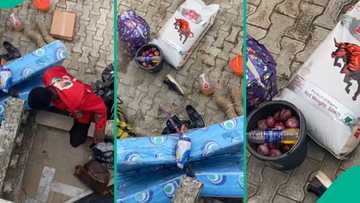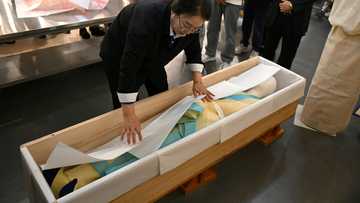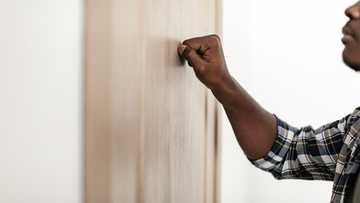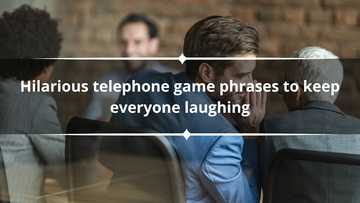My Roommate Kept Stealing My Food — I Set a Trap and It Brought Us Closer
The kitchen's silence, usually a space of comforting domestic noise, was now a cold, accusing stillness. I stood before the open refrigerator, the fluorescent light casting a stark, uncompromising glare on the empty shelf. My signature dish, my magnificent, deep-red Jollof rice, was gone.

Source: Getty Images
It was not just a scoop or a corner nibbled by a forgetful hand. The entire, heavy, two-litre stainless steel bowl was absent. It was the only thing I had placed there last night, gleaming under its cling-film cover, a promise of a future meal.
Now, nothing but a faint, dried smear of pepper paste marked its territory on the glass shelf, a gruesome trace of the culinary crime. My breath hitched, a sharp, ragged sound in the quiet morning.
This wasn't a surprise; it was the sickening confirmation of my plan. The thief had struck precisely as I'd calculated, drawn in by the intoxicating aroma of my ata dindin (fried pepper sauce) and tomato blend.

Read also
“I fainted last week”: UNILORIN students cry out, endure 4-hour queues as transport crisis worsens

Source: Getty Images
I ran a hand through my hair, the cold air from the fridge raising goosebumps on my arm. The feeling that settled over me was a strange, toxic cocktail of grim satisfaction and profound guilt. Satisfaction, because I had them. Guilt, because of the weapon I had used.
I hadn't added onions, ginger, and bay leaves to that perfectly seasoned rice. I had crushed three over-the-counter laxative tablets, dissolving them into the centre, and masking the slight bitterness with extra chilli flakes.
It was a measure of desperation, an act of justice carried out by a person driven to the wall by weeks of disrespect. My own ethical lines had been crossed, blurred by the relentless, quiet thievery.

Source: Getty Images
I closed the fridge door, the gentle thump sounding in my ears like a judge's gavel. Today was supposed to be a day of communal joy: our quarterly movie marathon, a tradition meant to solidify our bond as housemates, our small 'family' away from home. But it would be a day of reckoning for one person in the next room.

Read also
Catholic priest points what naval officer did rightly during his altercation with Nyesom Wike
I strolled towards the living area, forcing my face into a mask of casual morning cheer. Amara was wrestling with the projector cables, her usual vibrant energy starkly contrasting my internal tension.
Abisola was on her phone, already laughing at a video. And Sade, quiet Sade, was meticulously arranging cushions on the sofa, her back to me.
I studied her back. Was it her? She was always the least suspicious, the one who kept to herself, rarely venturing into the kitchen for anything beyond boiling water.

Source: Getty Images
The thought of it being her sent a new spike of anguish through me. I sat down, my gaze fixed on the trio. My anger was now a hollow ache. The thief was among us, sitting side-by-side, preparing to share popcorn and laughter, all while carrying the slow, terrible weight of my chemical justice in their stomach.
I was no longer a victim but the architect of their discomfort. The movie was starting, but I knew the real drama would occur in the restroom.
Moving into the four-bedroom flat complex near a university in Lagos fulfilled a long-held dream. This was freedom, independence, and the start of our journey to becoming Nigeria's future leaders. We were four young adults, each carrying the weight of familial expectations and limited budgets.

Source: Getty Images
We had all met during orientation week: myself, Yinka, a meticulous and passionate cook; Amara, the boisterous and well-connected social butterfly; Abisola, the easy-going, sometimes too-relaxed philosophy student; and Sade, the quiet, reserved girl studying accounting.
From the first week, we recognised the potential for disaster in a shared kitchen. Money was tight for all of us. A kilo of frozen chicken or a generous sack of rice wasn't just food; it was a resource, a budgeted expense that often stretched our meagre allowances from home.
To lose food was to lose money and, critically, future sustenance. This led to a famous set of rules we drafted on a whiteboard, now faded but sacred. Every item must be clearly labelled with your name and the date.
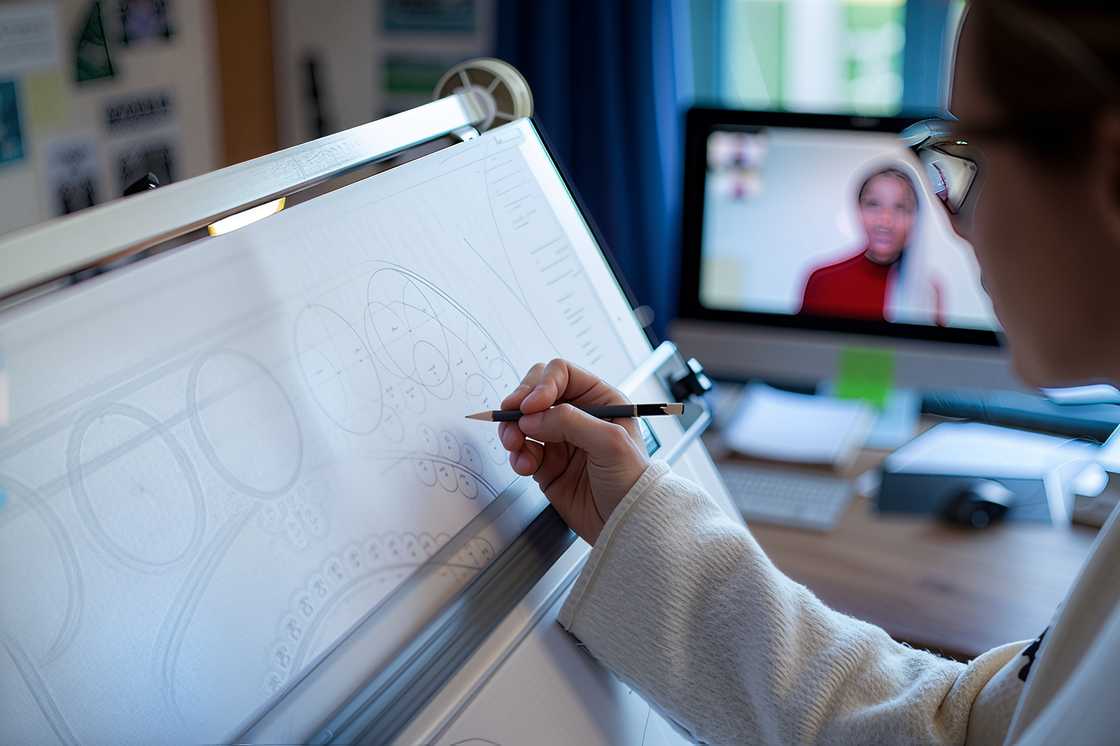
Source: Getty Images
Do not, under any circumstances, consume, borrow, or even taste a labelled item without the explicit, verbal permission of the owner. The salt, oil, and basic spices are for everyone. Everything else is private property.
Amara had been the most vocal defender of the Constitution, arguing that boundaries were the bedrock of respect. Surprisingly, Abisola agreed, saying, "Babe, relax. Respect is paramount. We are a family now, and families don't steal from one another."
Sade, ever the quiet observer, had nodded her agreement, adding her name to the bottom of the list with a neat, precise script.

Source: Getty Images
For me, the stakes were exceptionally high. My cooking was my therapy. After a long, gruelling day of engineering lectures, preparing a meal was my release. When I cooked, I made enough for two or three servings.
That meticulously prepared, carefully stored container in the fridge wasn't just lunch; it was the tangible result of my effort, time, and precious allowance. Therefore, violating the Constitution wasn't just a minor squabble over a piece of Agege bread.
It was an erosion of the trust that held our tiny home together. It was a calculated affront to my financial planning and my emotional security. Someone had decided that their hunger, or greed, outweighed the respect they owed me and their promise to the family.

Source: Getty Images
I was now living with a thief, a silent viper, and I couldn't bear the thought of being continually played for a fool. The peace of our home was balanced on the edge of a knife, and the food thief was slowly carving it up.
The thievery started subtly, and the incidents were isolated enough that I could dismiss them as 'mistakes' until they couldn't be. First, it was the small, inconvenient disappearances. A pack of expensive sachets of coffee vanished from the cabinet.
Then, half a loaf of my favourite local bread. I mentioned it casually. Amara offered a genuinely confused shrug, Abisola was too busy to notice, and Sade looked down, focusing on her notes.

Source: Getty Images
I swallowed my annoyance, thinking, "Maybe someone was desperate, they'll replace it." They never did. The thief grew bolder and more confident, striking at my most prized possessions. This was no mistake; it required deliberate effort to take and hide.
Then, the ultimate insult: my frozen bag of Smoked Turkey pieces, a rare and expensive treat from the Oshodi market, was gone. That particular theft hit me hard. It was a luxury item, and to lose it was a significant financial setback.
I started hiding my food. I wrapped my snacks in layers of old newspaper and placed my containers behind large, unlabeled jars of homemade Ata Dindin in the fridge. But the thief was an expert. They found my carefully sliced pieces of fresh avocado, intended for a salad, and took them.

Source: Getty Images
I was furious, my frustration peaking after the smoked turkey incident. That evening, I called an emergency house meeting. The air was thick, charged with my palpable anger.
"I'm sorry, but this stops now," I announced, standing over them. "My food is being stolen, repeatedly. I have checked the labels. I have asked politely. Now I am demanding an answer. Who is doing this?"
Amara's jaw tightened. She hated conflict. "Yinka, don't you dare accuse us like this. We all follow the Constitution. If you want to know who is stealing, ask someone else!" Her defence was quick and sharp.

Source: Getty Images
Abisola, ever the smooth talker, tried to deflect. "Bra, relax. Maybe you have a sleep-eating problem. Sometimes, when I'm studying late, I eat and don't remember." She laughed, trying to lighten the mood. The suggestion was insulting.
Then Sade, surprisingly, chimed in, her voice surprisingly steady. "She's right, Yinka. You've been so stressed lately, running on fumes. Maybe you ate the smoked turkey when tired and had just forgotten. Don't spoil the peace in the house over a small thing."
Her words, using the exact item that was stolen, and then dismissing my financial loss as a "small thing", felt like a physical blow. She was suggesting I was crazy. Sade was minimising my loss. I felt completely disrespected, betrayed, and utterly alone in my own home.

Source: Getty Images
That was the moment I realised that rational appeals were over. I wouldn't be gaslit. I would prove them wrong and find the thief, no matter the cost. Driven by that cold, stern resolve, I went to the market the next day.
I splurged on the ingredients for my most popular dish: Jollof rice. I made it perfect; the tomatoes caramelised just right, and the fragrance was overwhelming. I packed it into an obvious, sealed container, a tempting beacon in the fridge.
I crushed the tablets into a fine, odourless powder in my room. As I stirred the powder into the rice, a self-doubt washed over me. This was extreme. This was a violation. But the alternative, living with constant, quiet betrayal, felt worse. The Constitution is broken, I told myself, steeling my nerve.

Source: Getty Images
The rules of engagement have changed. I covered the container, placed it front-and-centre, and waited for the thief to finish my Jollof and their anonymity.
The next day, Saturday, the plan was simple: movie marathon, copious amounts of popcorn, and a lot of shared laughter. But my eyes constantly tracked the trio, searching for the first sign of distress.
About forty-five minutes into the first romantic comedy, a genre Sade usually adored, she started fidgeting. She shifted her weight, crossed her legs, and then uncrossed them. She checked her phone repeatedly, as if trying to distract herself from an internal pressure.

Source: Getty Images
Finally, she let out a small, almost inaudible groan. "I—I need to step out for a bit. Just a quick call." She was pale, with a thin sheen of sweat on her forehead. Ten minutes later, she returned, looking utterly defeated. Amara and Abisola were oblivious, deep in conversation about the movie plot.
But the pattern established itself quickly. Ten minutes of relative peace, followed by a sudden, anxious urgency. "Oh, my stomach! That pepper soup I had yesterday must be bad. So sorry, guys." Her excuses were flimsy, her attempts at a usual smile failing.
When she returned for the third time, her eyes darted nervously around the room, avoiding mine entirely. She was clutching her abdomen, and the colour had drained completely from her face. I knew it was time.

Source: Getty Images
I muted the television, startling Amara and Abisola. "Sade," I said, quiet but firm, "can you come to the hallway with me? There's something urgent we need to discuss." The fear in her eyes was agonising. She knew. She stumbled up and followed me, leaving the two others utterly confused.
I faced her in the hallway, away from the prying eyes. The movie's noise was a muffled backdrop to our heavy silence. "The Jollof," I stated, my voice almost a whisper. "Did you take the Jollof from the fridge last night, Sade?"
Her resistance crumbled instantly. She didn't deny it. Tears began to stream down her face. "Yes, Yinka. I took it. I'm so sorry." I watched her, my heart sinking lower with every passing second.
"I know you did, Sade. Because I put a strong laxative in that food." Her reaction was physical. She gasped, clenching her stomach in pain. "Oh, God, Yinka! You, you did that?"
"I was angry," I admitted, the shame heavy on my tongue. "I felt disrespected and played. I wanted to catch the thief. Now tell me, why? Why did you keep stealing my food, Sade? Why did you lie to my face?"
The confession poured out of her, a raw, painful torrent of shame and desperate truth. "I lost my part-time library job a month and a half ago. It was supposed to cover my fees and food. I've called home, but my mum is sick, and they are struggling.

Source: Getty Images
I have no money left, Yinka. I was so embarrassed. You guys are so hardworking, and you all have your budgets. I couldn't bear to admit I was failing and starving." She wasn't greedy. She wasn't malicious.
She was a hungry, terrified student who had been too proud to admit her struggle to her housemates. The image of the calculated thief I had hunted vanished, replaced by the reality of a starving friend. The disrespect I had felt was absolute, but the motive was survival.
The anger that fueled my extreme action evaporated, leaving behind a powerful, cold wave of empathy. I helped Sade back to her room, where she could finally rest and recover from the trap I had laid.
The immediate, painful consequence of the laxative was her karma, but the most profound result was the shame that had forced her into isolation. Now, it was our job to heal that shame.

Source: Getty Images
Later that evening, after Sade had settled, I gathered Amara and Abisola. I told them everything, without dwelling on the laxative, but emphasising the depth of Sade's hidden distress. Their initial reaction was shock, followed by genuine remorse.
Amara burst into tears. "Oh, my sister! Why didn't she say anything? We are supposed to be a team!" Abisola, usually so aloof, looked genuinely stricken. The betrayal was instantly forgotten, replaced by a fierce, collective need to protect one of their own.
We talked for hours, rewriting not the Constitution, but the spirit of our community. We immediately scrapped the rigid labelling system. We pooled a portion of our individual food budgets to create a communal pot.

Source: Getty Images
Amara, Abisola, and I decided we would take turns cooking large, inexpensive, and nutritious Nigerian meals enough for all four of us, every night. Sade would contribute when she could, even if it were just washing the dishes.
We turned our study sessions into a job-search war room. Abisola, the best writer, helped her rework her CV, making her accounting experience shine. Amara, who had connections in various businesses through her social activities, personally called two of her contacts and put in a good word for Sade.
I created a dedicated email alert system for finance roles and helped her practice interview questions. Sade blossomed almost immediately. Relieved of the crushing weight of her secret and the constant, debilitating hunger, she was present again.

Source: Getty Images
She smiled, contributed to discussions, and studied with renewed vigour. Over the next three weeks, the community effort paid off handsomely. Sade had three promising interviews, and the one with a major accounting firm looked particularly strong.
"I don't know how I can ever repay you," she confessed one night as we ate a massive bowl of gari (Eba) and egusi soup. "You repay us by graduating, getting that job, and making us proud," I told her.
The Kitchen Constitution had been broken, but we had built something more substantial in the wreckage: a true family, founded not on rules, but unconditional support.

Source: Getty Images
The lesson I took from this painful saga was one of profound human connection: The boundaries we draw to protect ourselves can often isolate those who need us most.
I had been so focused on upholding the letter of the Kitchen Constitution, Thou Shalt Not Steal, that I failed to see the much larger, more critical need for a Humanity Clause, Thou Shalt Not Suffer Alone.
My anger, while justified by the theft, closed my eyes to the underlying tragedy of my housemate's situation. I treated the symptom (the stealing) with aggression when I should have been addressing the disease (the hunger and the shame).

Source: Getty Images
My trap successfully caught the thief, but its true power was that it forced a confession that revealed a much deeper truth about our relationship. It showed us that we were more than just co-tenants splitting utility bills; we were a safety net.
In a culture like Nigeria, where community and familial support are paramount, we mistakenly allowed the Western concept of rigid individual property rights to override our obligation to the collective well-being. The most important thing was Sade's well-being.
The story taught me that true strength lies not in enforcing rules against the vulnerable but in creating a safe and non-judgmental communal space where a friend would feel comfortable saying, "I am starving. I need help."

Source: Getty Images
The fridge's boundaries were broken, but the boundaries of our hearts were opened, and that was the most significant, most satisfying consequence of all.
How often do we prioritise small rules and surface-level justice over the radical, life-changing power of compassion and community?
This story is inspired by the real experiences of our readers. We believe that every story carries a lesson that can bring light to others. To protect everyone's privacy, our editors may change names, locations, and certain details while keeping the heart of the story true. Images are for illustration only. If you'd like to share your own experience, please contact us via email.
Source: YEN.com.gh


